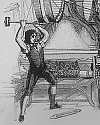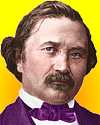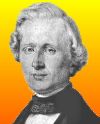 | TODAY IN SCIENCE HISTORY
NEWSLETTER - 11 MARCH |
 On 11 Mar 1811, the Luddite riots began, breaking up factory machinery. They were the response of an impoverished workforce again the threat of new inventions replacing their handworking livelihoods. On 11 Mar 1811, the Luddite riots began, breaking up factory machinery. They were the response of an impoverished workforce again the threat of new inventions replacing their handworking livelihoods.
It was an ugly, sometimes bloody, time. If only the idiom "Luddite" is familiar to you, it is worth knowing more about this history of the impact of new technology by reading Machinery Riots.
|
 On 11 Mar 1918, at the height of World War I, the first cases were reported of what became the modern plague, spreading death to millions worldwide. Today's Science Store pick is The Great Influenza: The Story of the Deadliest Pandemic In History, by John M. Barry. In this highly-recommended book, the author captures the sense of panic and despair that overwhelmed stricken communities and hits hard at those who failed to use their power to protect the public good. He also describes the work of the dedicated researchers who rushed to find the cause of the disease and create vaccines. You can't read this book without changing your perspective on why scientists worry at the emergence of a possibly deadly strain of flu in our present times. On 11 Mar 1918, at the height of World War I, the first cases were reported of what became the modern plague, spreading death to millions worldwide. Today's Science Store pick is The Great Influenza: The Story of the Deadliest Pandemic In History, by John M. Barry. In this highly-recommended book, the author captures the sense of panic and despair that overwhelmed stricken communities and hits hard at those who failed to use their power to protect the public good. He also describes the work of the dedicated researchers who rushed to find the cause of the disease and create vaccines. You can't read this book without changing your perspective on why scientists worry at the emergence of a possibly deadly strain of flu in our present times.
New: $17.00. Save 33% Price $11.44. Available Used from $0.66 (as of time of writing). Yesterday's pick: Mechanism, Experiment, Disease: Marcello Malpighi and Seventeenth-Century Anatomy, by Domenico Bertoloni Meli.
For picks from earlier newsletters, see the Today in Science Science Store home page. | |

| "If scientific reasoning were limited to the logical processes of arithmetic, we should not get very far in our understanding of the physical world. One might as well attempt to grasp the game of poker entirely by the use of the mathematics of probability."
- Vannevar Bush, American electrical engineer. (born 11 Mar 1890)  |
 | "How dare we speak of the laws of chance? Is not chance the antithesis of all law?" - Joseph Bertrand, French mathematician and educator. (born 11 Mar 1822)  |

| "Statistics are somewhat like old medical journals, or like revolvers in newly opened mining districts. Most men rarely use them, and find it troublesome to preserve them so as to have them easy of access; but when they do want them, they want them badly."
- John Shaw Billings, American surgeon and librarian who modernized the Library of the Surgeon-General's Office of the Army. (died 11 Mar 1913)  |
| Before you look at today's web page, see if you can answer some of these questions about the events that happened on this day. Some of the names are very familiar. Others will likely stump you. Tickle your curiosity with these questions, then check your answers on today's web page. |
 |  Urbain-Jean-Joseph Le Verrier, born 11 Mar 1811, was a French astronomer who predicted by mathematical means the existence of two unobserved planets. He was successful concerning one - Neptune outside the orbit of Uranus - but wrong concerning the other within the orbit of Mercury. Urbain-Jean-Joseph Le Verrier, born 11 Mar 1811, was a French astronomer who predicted by mathematical means the existence of two unobserved planets. He was successful concerning one - Neptune outside the orbit of Uranus - but wrong concerning the other within the orbit of Mercury.  What was the name of his incorrectly predicted planet? What was the name of his incorrectly predicted planet? |
 |  Philo Taylor Farnsworth (1906-1971) was an American electronics pioneer in the field of television. Farnsworth's basic television patents covered scanning, focusing, synchronizing, contrast, controls, and power. He also invented the first cold cathode ray tubes and the first simple electronic microscope. Philo Taylor Farnsworth (1906-1971) was an American electronics pioneer in the field of television. Farnsworth's basic television patents covered scanning, focusing, synchronizing, contrast, controls, and power. He also invented the first cold cathode ray tubes and the first simple electronic microscope.
 In what decade did he demonstrate his first complete television system? In what decade did he demonstrate his first complete television system? |
 |  Sir Alexander Fleming (1881-1955) was a Scottish bacteriologist, who was working in 1928 on influenza virus, when he observed that mould had developed accidentally on a staphylococcus culture plate and that the mould had created a bacteria-free circle around itself. He experimented further and he found that a mould culture prevented growth of staphylococci, even when diluted 800 times. Sir Alexander Fleming (1881-1955) was a Scottish bacteriologist, who was working in 1928 on influenza virus, when he observed that mould had developed accidentally on a staphylococcus culture plate and that the mould had created a bacteria-free circle around itself. He experimented further and he found that a mould culture prevented growth of staphylococci, even when diluted 800 times.
 What name did he give to this active substance he found in the mould? What name did he give to this active substance he found in the mould? |
 |  On 11 Mar of a certain year, the Luddite riots began in Nottingham, England. There was poverty and misery, made worse by the new inventions - machinery which could do jobs better and faster than people. A group of laborers attacked a factory, breaking up 63 stocking and lace manufacturing frames, the machines which they feared would replace them. During the next three weeks gangs of upwards of fifty men, armed with pistols, guns and heavy hammers broke two hundred more frames. On 11 Mar of a certain year, the Luddite riots began in Nottingham, England. There was poverty and misery, made worse by the new inventions - machinery which could do jobs better and faster than people. A group of laborers attacked a factory, breaking up 63 stocking and lace manufacturing frames, the machines which they feared would replace them. During the next three weeks gangs of upwards of fifty men, armed with pistols, guns and heavy hammers broke two hundred more frames.  In what decade did the Luddite riots begin? In what decade did the Luddite riots begin? |

|  In 1918, the first cases were reported of what became a deadly new influenza epidemic in the U.S. In this, the worst epidemic in American history, over 600,000 people died, and worldwide the death toll was up to 40 million people. In 1918, the first cases were reported of what became a deadly new influenza epidemic in the U.S. In this, the worst epidemic in American history, over 600,000 people died, and worldwide the death toll was up to 40 million people.  By what name is this influenza known? By what name is this influenza known? |
When you have your answers ready to all the questions above, you'll find all the information to check them, and more, on the March 11 web page of Today in Science History. Or, try this link first for just the brief answers.
Fast answers for the previous newsletter for March 10: Neptunist theory; German; sodium sulphate; the decade including the year 1948; telephone exchange selector switch. |
 If you enjoy this newsletter, the website, or wish to offer encouragement or ideas, please send feedback by using your mail reader Reply button. If you enjoy this newsletter, the website, or wish to offer encouragement or ideas, please send feedback by using your mail reader Reply button. |
--
If you do not want to receive any more newsletters,
Unsubscribe To update your preferences and to unsubscribe visit
this link 


 On 11 Mar 1811, the Luddite riots began, breaking up factory machinery. They were the response of an impoverished workforce again the threat of new inventions replacing their handworking livelihoods.
On 11 Mar 1811, the Luddite riots began, breaking up factory machinery. They were the response of an impoverished workforce again the threat of new inventions replacing their handworking livelihoods.



 Urbain-Jean-Joseph Le Verrier, born 11 Mar 1811, was a French astronomer who predicted by mathematical means the existence of two unobserved planets. He was successful concerning one - Neptune outside the orbit of Uranus - but wrong concerning the other within the orbit of Mercury.
Urbain-Jean-Joseph Le Verrier, born 11 Mar 1811, was a French astronomer who predicted by mathematical means the existence of two unobserved planets. He was successful concerning one - Neptune outside the orbit of Uranus - but wrong concerning the other within the orbit of Mercury.  What was the name of his incorrectly predicted planet?
What was the name of his incorrectly predicted planet?
 Philo Taylor Farnsworth (1906-1971) was an American electronics pioneer in the field of television. Farnsworth's basic television patents covered scanning, focusing, synchronizing, contrast, controls, and power. He also invented the first cold cathode ray tubes and the first simple electronic microscope.
Philo Taylor Farnsworth (1906-1971) was an American electronics pioneer in the field of television. Farnsworth's basic television patents covered scanning, focusing, synchronizing, contrast, controls, and power. He also invented the first cold cathode ray tubes and the first simple electronic microscope. In what decade did he demonstrate his first complete television system?
In what decade did he demonstrate his first complete television system? 
 Sir Alexander Fleming (1881-1955) was a Scottish bacteriologist, who was working in 1928 on influenza virus, when he observed that mould had developed accidentally on a staphylococcus culture plate and that the mould had created a bacteria-free circle around itself. He experimented further and he found that a mould culture prevented growth of staphylococci, even when diluted 800 times.
Sir Alexander Fleming (1881-1955) was a Scottish bacteriologist, who was working in 1928 on influenza virus, when he observed that mould had developed accidentally on a staphylococcus culture plate and that the mould had created a bacteria-free circle around itself. He experimented further and he found that a mould culture prevented growth of staphylococci, even when diluted 800 times. What name did he give to this active substance he found in the mould?
What name did he give to this active substance he found in the mould? 
 On 11 Mar of a certain year, the Luddite riots began in Nottingham, England. There was poverty and misery, made worse by the new inventions - machinery which could do jobs better and faster than people. A group of laborers attacked a factory, breaking up 63 stocking and lace manufacturing frames, the machines which they feared would replace them. During the next three weeks gangs of upwards of fifty men, armed with pistols, guns and heavy hammers broke two hundred more frames.
On 11 Mar of a certain year, the Luddite riots began in Nottingham, England. There was poverty and misery, made worse by the new inventions - machinery which could do jobs better and faster than people. A group of laborers attacked a factory, breaking up 63 stocking and lace manufacturing frames, the machines which they feared would replace them. During the next three weeks gangs of upwards of fifty men, armed with pistols, guns and heavy hammers broke two hundred more frames.  In what decade did the Luddite riots begin?
In what decade did the Luddite riots begin? 
 In 1918, the first cases were reported of what became a deadly new influenza epidemic in the U.S. In this, the worst epidemic in American history, over 600,000 people died, and worldwide the death toll was up to 40 million people.
In 1918, the first cases were reported of what became a deadly new influenza epidemic in the U.S. In this, the worst epidemic in American history, over 600,000 people died, and worldwide the death toll was up to 40 million people.  By what name is this influenza known?
By what name is this influenza known?  If you enjoy this newsletter, the website, or wish to offer encouragement or ideas, please send feedback by using your mail reader Reply button.
If you enjoy this newsletter, the website, or wish to offer encouragement or ideas, please send feedback by using your mail reader Reply button. 

Δεν υπάρχουν σχόλια:
Δημοσίευση σχολίου